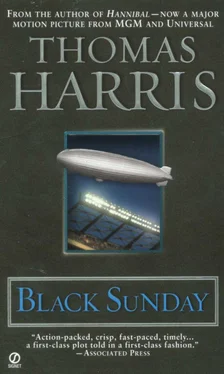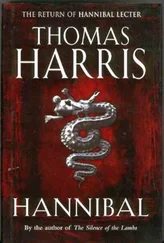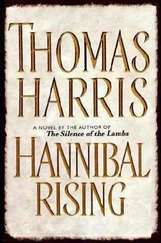Kabakov recognized an expert interrogator when he saw one. Corley was being the advocate. “Exactly,” he said.
“An operation might be mounted in another country and moved here at the last minute,” Corley said. “Why do you think the woman is based here?”
“Najeer’s apartment had been under surveillance for some time,” Kabakov explained. “She was not seen in Beirut before or after the night of the raid. Two linguists in the Mossad analyzed the tape independently and came to the same conclusion: She learned English as a child from a Briton, but has been exposed to American English for the last year or two. American-made clothing was found in the room.”
“Maybe she was just a courier, taking final instructions from Najeer,” Fowler. said. “Instructions could be passed on anywhere.”
“If she were only a courier, she would never have seen Najeer’s face,” Kabakov said. “Black September is compartmented like a wasp’s nest. Most of their agents know only one or two others in the apparatus.”
“Why didn’t you kill the woman, too, Major?” Fowler was not looking at Kabakov when he said this. If he had been looking, he would not have looked long.
The ambassador spoke for the first time. “Because there was no reason to kill her at the time, Mr. Fowler. I hope you do not come to wish he had.”
Kabakov blinked once. These men did not understand the danger. They would not be warned. Behind his eyes, Kabakov saw the Arab armor thundering across the Sinai and into the cities, herding Jewish civilians. Because there were no planes. Because the Americans had been sickened. Because he had spared the woman. His hundred victories were ashes in his mouth. The fact that he could not possibly have known that the woman was important did not excuse him in the slightest in his own eyes. The mission to Beirut had not been perfect.
Kabakov stared into Fowler’s jowly face. “Do you have a dossier on Hafez Najeer?”
“He appears in our files on a list of Al Fatah officers.”
“A complete dossier on him is included with my report. Look at the pictures, Mr. Fowler. They were taken after some of Najeer’s earlier projects.”
“I’ve seen atrocities.”
“Not like these you haven’t.” The Israeli’s voice was rising.
“Hafez Najeer is dead, Major Kabakov.”
“And the good was interred with his bones, Fowler. If this woman is not found, Black September will rub your nose in guts.”
Fowler glanced at the ambassador as though he expected him to intervene, but Yoachim Tell’s small, wise eyes were hard. He stood with Kabakov.
When the major spoke again, his voice was almost too quiet. “You must believe it, Mr. Fowler.”
“Would you recognize her again, Major?” Corley asked.
“Yes.”
“If she were based here, why would she go to Beirut?”
“She needed something she could not get here. She needed something that only Najeer could get for her, and she had to confirm something personally for him in order to get it.” Kabakov knew this sounded vague and he was not happy about it. He was also displeased with himself for using the word something three times in a row.
Fowler opened his mouth, but Corley interrupted him. “That wouldn’t be guns.”
“Coals to Newcastle, bringing guns here,” Fowler said gloomily.
“It would have to be either equipment or access to another cell or to a highly placed agent,” Corley continued. “I doubt that she needed access to an agent. As far as I can tell, U.A.R. intelligence here is a sorry lot.”
“Yes,” the ambassador said. “The embassy handyman sells them the contents of my wastebasket. He also buys from their handyman the contents of theirs. We load ours with junk mail and fictitious correspondence. Theirs runs heavily to duns from creditors and advertisements for unusual rubber products.”
The meeting continued for another thirty minutes before the Americans rose to go.
“I’ll try to get this on the agenda at Langley in the morning,” Corley said.
“If you wish, I could—”
Fowler interrupted Kabakov. “Your report and the tape will be sufficient, Major.”
It was after three a.m. when the Americans left the embassy.
“Oy, the Arabs are coming,” Fowler said to Corley as they walked to the cars.
“What do you think?”
“I think I don’t envy you having to take up Blue Eyes Ben-nett’s time with that stuff tomorrow,” Fowler said. “If there are some crackpots here, the Agency is out of it, old buddy. No fooling around in the U.S.A.” The CIA was still smarting from Watergate. “If the Middle East section turns up anything, we’ll let you know.”
“Why were you so pissed off in there?”
“I’m tired of it,” Fowler said. “We’ve worked with the Israelis in Rome, in London, Paris, once even in Tokyo. You finger an Arab, cut them in on it, and what happens? Do they try to turn him? No. Do they watch him? Yes. Just long enough to find out who his friends are. Then there is a big bang. The Arabs are wiped out, and you are left holding your schwantz.”
“They didn’t have to send Kabakov,” Corley said.
“Oh, yes, they did. You’ll notice the military attaché Weisman wasn’t there. We both know he has an intelligence function. But he’s coordinating the Phantom sale. They don’t want to connect the two things officially at all.”
“You’ll be at Langley tomorrow?”
“I’ll be there all right. Don’t let Kabakov get your ass in a crack.”
Each Thursday morning the American intelligence community meets in a windowless, lead-shielded room in Central Intelligence Agency headquarters at Langley, Virginia. Represented are the CIA, FBI, National Security Agency, the Secret Service, the National Reconnaissance Office, and the military intelligence advisors to the Joint Chiefs of Staff. Specialists are called in when necessary. The agenda has a subscription list of fourteen. There are many subjects to be discussed and time is strictly limited.
Corley spoke for ten minutes, Fowler for five, and the representative from the Immigration and Naturalization subversive section had less time than that.
Kabakov was waiting in Corley’s small office at FBI headquarters when he returned from the meeting.
“I’m supposed to thank you for coming,” Corley said. “State is going to thank the ambassador. Our ambassador in Tel Aviv is going to thank Yigal Allon.”
“You’re welcome. Now what are you going to do?”
“Damn little,” Corley said, lighting his pipe. “Fowler brought a stack of tapes recorded off Radio Cairo and Radio Beirut. He said they were all threats of various kinds that came to nothing. The Agency is voiceprinting your tape against them.”
“This tape is not a threat. It was made to be used afterward.”
“The Agency is checking its sources in Lebanon.”
“In Lebanon the CIA buys the same shit we do, from a lot of the same people,” Kabakov said. “The kind of stuff that’s two hours ahead of the newspapers.”
“Sometimes not even two hours,” Corley said. “In the meantime, you can look at pictures. We’ve got about a hundred known Al Fatah sympathizers on file, people we think are in the July Fifth movement here. Immigration and Naturalization doesn’t advertise it, but they have a file on suspicious Arab aliens. You’ll have to go to New York for that.”
“Can you put out a general customs alert on your own authority?”
“I’ve done that. It’s our best bet. For a major job they probably would have to bring in the bomb from outside, that is if it’s a bomb,” Corley said. “We’ve had three small explosions linked to the July Fifth movement in the past two years, all at Israeli offices in New York. From that—”
Читать дальше












